| Srl | Item |
| 1 |
ID:
082367
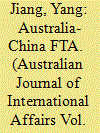

|
|
|
|
|
| Publication |
2008.
|
| Summary/Abstract |
This article seeks to explain why the Free Trade Agreement negotiation between Australia and China has been extremely difficult, despite political goodwill from Beijing and Canberra. It first argues that the reason for the slow progress of the negotiation is not caused by lack of motivation from the Chinese government. It then lists the differences in negotiation between China and Australia, focusing on their respective selective vs. comprehensive, border vs. behind-the-border, flexible vs. rigid and state vs. market approaches. It then looks into domestic politics in China to explain why China has taken such a stance, underlining domestic resistance from sectors like agriculture and services in a dynamic domestic political environment on the one hand, and the structure of the policymaking institution that constrains the power of trade negotiators on the other. It concludes by pointing out where the potential for a breakthrough in the FTA negotiation lies.
|
|
|
|
|
|
|
|
|
|
|
|
|
|
|
|
| 2 |
ID:
082370
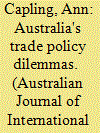

|
|
|
|
|
| Publication |
2008.
|
| Summary/Abstract |
In recent years, Australia has had a very active agenda for the negotiation of preferential trade agreements (PTAs) whose net economic benefits remain at best unclear. There has been a strong defensive element to some of this PTA activity but the Howard government also used PTAs to pursue non-economic objectives, such as the promotion of foreign policy and security interests. This article broadly outlines Australia's PTA policy and the problems and dilemmas that it has generated. More importantly, it looks ahead to consider likely scenarios for trade policy under the Rudd Labor government. Each of these scenarios has different implications for policy strategies and outcomes. This article concludes that while there could be significant pay-offs should Labor choose to pursue its traditional preferences for non-discriminatory trade arrangements, the world has changed considerably since the heydays of the multilateral trade system. A commitment to reinvigorating multilateralism will require strong political leadership, imaginative thinking, and creative diplomacy
|
|
|
|
|
|
|
|
|
|
|
|
|
|
|
|
| 3 |
ID:
082368
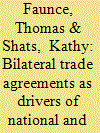

|
|
|
|
|
| Publication |
2008.
|
| Summary/Abstract |
This article compares controversial health technology provisions in two important United States free trade agreements with developed nations: Australia and with South Korea. It examines the multinational corporate forces behind the medicines and medical devices components of these texts and their likely impacts upon Australian trade negotiations with China and India. It also examines the implications of some recent changes to US trade policy for this area in subsequent bilateral deals such as that with Peru. This article argues it is important that the Australian government change policy and, like the present Congress in the United States, now systematically approach such impending trade agreements with a view to assisting the partners' regulatory frameworks to maximally enhance national and transnational benefit from their medicines and biotechnology industries
|
|
|
|
|
|
|
|
|
|
|
|
|
|
|
|
| 4 |
ID:
082365


|
|
|
|
|
| Publication |
2008.
|
| Summary/Abstract |
This paper gives a short history of the development of preferential trade agreements (PTAs), followed by a summary of the economics of PTAs. The paper then examines the typical coverage of recent PTAs, and assesses their likely economic effects. Political economy considerations mean that PTAs have tended to be selective in two important ways-they have tended to be preferential, even in the provisions that go beyond goods trade, and they have tended to target only those provisions that explicitly discriminate against foreigners. This selectivity means that PTAs are an inferior path to deeper economic integration. For most of the Asian region, comprehensive domestic regulatory reform dominates as an integration strategy, while PTAs deliver relatively trivial gains. Multilateral action is an intermediate strategy, and is important for delivering trade liberalisation in sensitive sectors or in highly protected economies. These results appear to be relatively robust to the size of the PTA grouping.
|
|
|
|
|
|
|
|
|
|
|
|
|
|
|
|
| 5 |
ID:
082366
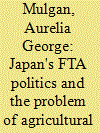

|
|
|
|
|
| Publication |
2008.
|
| Summary/Abstract |
Japan's willingness to negotiate Free Trade Agreements (FTAs) is not matched by a readiness to liberalise agricultural trade. Japan has used a variety of mechanisms to limit the extent of agricultural concessions in FTAs. Public choice theory predicts that FTAs are a more effective instrument for opening Japan's agricultural market than the WTO because they reshape the domestic politics of Japanese trade in ways that are conducive to further market opening. FTAs do this by altering the domestic politics of trade policymaking on the demand side as well as some aspects of the supply side. On the demand side, business groups mobilise even more strongly to demand an end to agricultural protection, whilst on the supply side, the value of FTAs for broader state interests are recognised by politician-leaders. Various structural obstacles in the policymaking process, however, prevent the altered demand and supply-side dynamics from necessarily delivering free trade outcomes.
|
|
|
|
|
|
|
|
|
|
|
|
|
|
|
|
| 6 |
ID:
082364
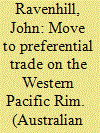

|
|
|
|
|
| Publication |
2008.
|
| Summary/Abstract |
Since* the turn of the century the Asia-Pacific region has become the most active location for the negotiation of preferential trade agreements (PTAs)-a dramatic change from the period before the financial crises of 1997-98. Substantial variance in scope exists among the more than 80 PTAs currently being implemented, negotiated or which are under study in the region. Those involving the United States are by far the most comprehensive. At the other end of the spectrum are those involving ASEAN and China, which are largely 'aspirational' in their provisions. This variance points to the range of economic and political objectives that PTAs serve. Regardless of the comprehensiveness of their coverage, the overall economic effects of the new PTAs is likely to be small given the prevailing low level of tariffs, the intervention of other factors such as fluctuating exchange rates, the proliferation of agreements (which removes the advantages they accord individual partners), and the unwillingness of governments to liberalise 'sensitive' sectors. Few of the agreements move substantially beyond existing WTO provisions. The proliferation of PTAs not only has tended to shift attention and resources away from negotiations at the global level but also runs the risk of fragmenting the 'pro-liberalisation' coalition in countries that have signed multiple agreements.
|
|
|
|
|
|
|
|
|
|
|
|
|
|
|
|
| 7 |
ID:
082363
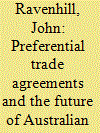

|
|
|
| 8 |
ID:
082369


|
|
|
|
|
| Publication |
2008.
|
| Summary/Abstract |
Most analysts agree that the recent proliferation of Preferential Trade Agreements (PTAs) is largely the result of exasperation with multilateral trade liberalisation through the World Trade Organisation and a defensive response to the large-scale adoption of PTAs by major economies. The spread of PTAs, however, suggests that there are motivations other than economic that are inspiring these trade deals. It is becoming increasingly obvious that the use of PTAs to gain or reinforce strategic benefits, or to forestall strategic disadvantage, has been a major but largely unacknowledged driver of the recent trend towards PTAs. Three profound shifts in the international system over the past 15 years have led to the declining utility of traditional security institutions and thus the search for new forms of strategic deal-making: an enduring crisis of security institutions; the rise of new great powers; and the arrival of non-state security threats. In response, both large and small powers have resorted to a range of instruments, including strategically-driven PTAs
|
|
|
|
|
|
|
|
|
|
|
|
|
|
|
|